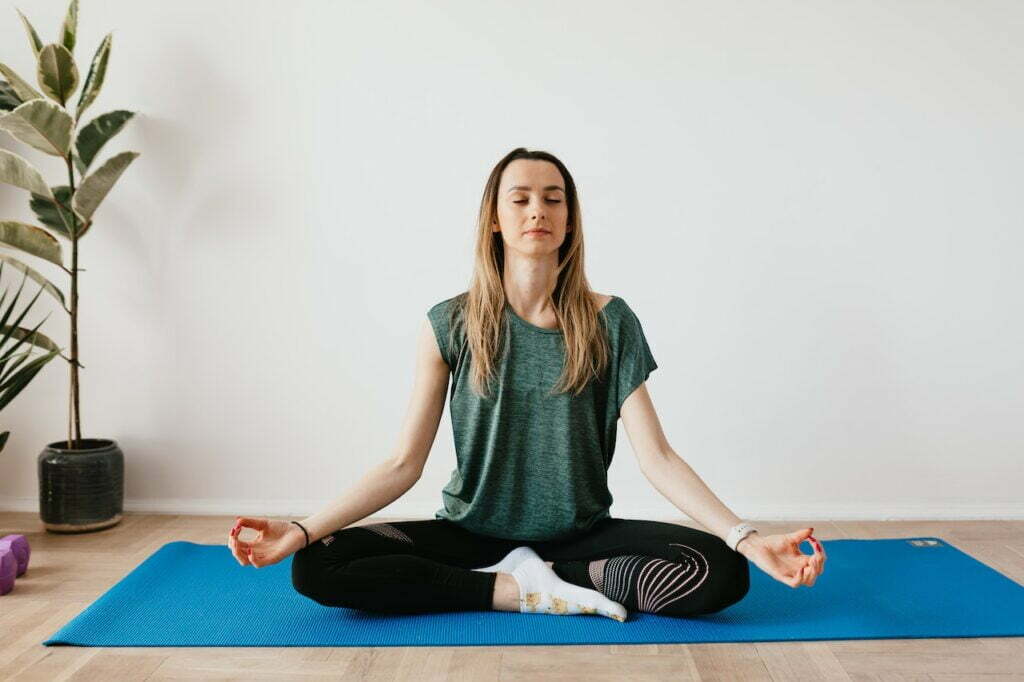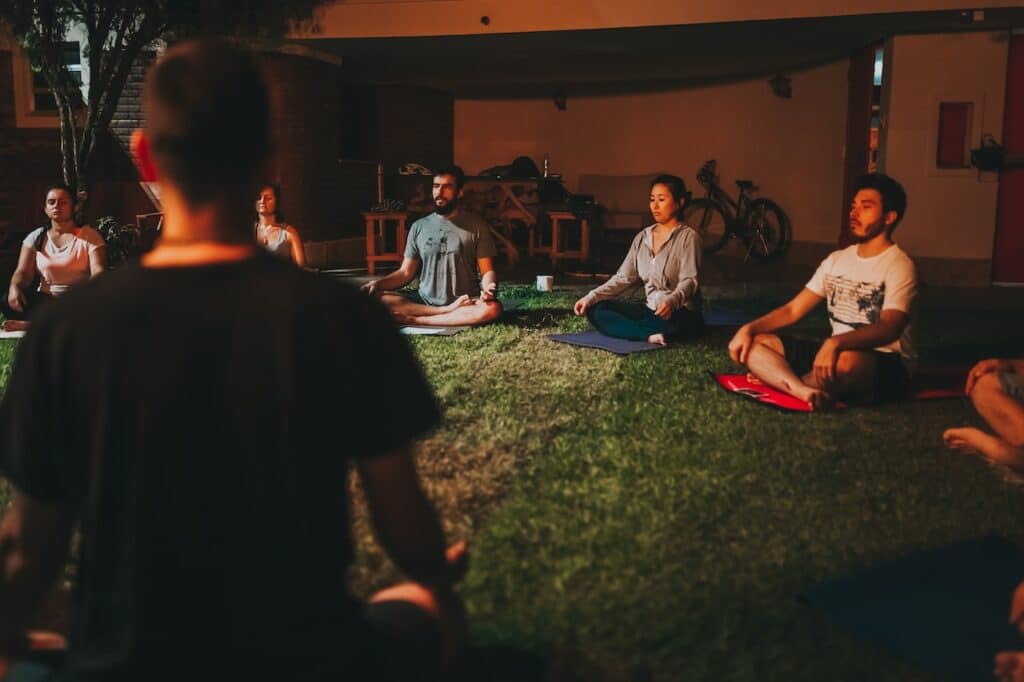Meditation for beginners. How it started
Once upon a time, I was a young man living in a bustling city. Life was always busy, and it felt like there was never enough time in the day to get everything done. One day, I stumbled upon an article about the benefits of meditation and decided to give it a try.
At first, it was challenging to quiet my mind and focus on my breath. My thoughts kept drifting towards my never-ending to-do list and the chaos of the city around me. But with practice, I began to notice a shift in my mindset.
As I sat in stillness each day, I became more aware of my thoughts and emotions. I learned how to observe them without judgment and release them with each exhale. Gradually, I started feeling more grounded and centered.
With continued practice, my meditation sessions grew longer and deeper. I found myself feeling more connected to the present moment and less anxious about the future or regretful about the past. My relationships improved as I became more patient with others and kinder to myself.
Eventually, meditation became an integral part of my daily routine. It transformed not only my mental state but also my physical health – I slept better at night, had fewer headaches, and felt less stressed overall.
Nowadays, whenever someone asks for advice on how to find inner peace amidst the chaos of daily life, I always recommend starting with meditation. And so it goes – one person’s journey towards mindfulness can inspire countless others along the way.
Why meditation is good for you?
Meditation is a practice that has been around for thousands of years and is known for its many benefits to the mind and body. Through the act of meditation, individuals can learn to quiet their minds, focus their attention, and achieve a sense of inner peace.
Meditation has been scientifically proven to reduce stress levels, lower blood pressure, improve sleep quality, and boost the immune system. It can also help with anxiety and depression by promoting feelings of calmness and relaxation.
In addition to physical benefits, meditation can also improve mental clarity and cognitive function. By training the mind to focus on one thing at a time, individuals can enhance their ability to concentrate and make better decisions.
Here are 15 tips for meditation for beginners
Start with short sessions
Starting with short sessions is one of the simplest meditation techniques for beginners to ease into practice. By gradually increasing the time spent meditating, you can build up your focus and stamina over time. With consistency and patience, even just a few minutes of meditation each day can have a positive impact on your mental and emotional well-being.
Chose a quiet place

Choosing a quiet space for meditation is important to minimize distractions and help you stay focused. It can be helpful to create a dedicated meditation space in your home where you can go to practice. By finding a peaceful environment, you can deepen your practice and experience the full benefits of meditation.
Sit comfortably
One of the most important meditation techniques for beginners is the sitting position. Sitting in a comfortable position is crucial for maintaining focus during meditation. Whether you choose to sit cross-legged on the floor or in a chair with your feet flat on the ground, it’s important to find a posture that supports your body without causing discomfort. By finding a comfortable position, you can fully immerse yourself in the practice of meditation and reap its many benefits.
Focus on your breath
Focusing on your breath is a fundamental part of meditation. By paying attention to the natural rhythm of your breath, you can quiet your mind and cultivate a sense of inner peace. Although it’s common for the mind to wander during meditation, simply acknowledging these thoughts and returning your focus to the breath can help you stay present in the moment.
Use guided meditation
For better understanding guidance can be very helpful for meditation for beginners. Guided meditations provide a structured approach to meditation that can be particularly helpful for beginners. These sessions are typically led by an experienced teacher who will guide you through various techniques designed to help you achieve a state of relaxation and mental clarity. By following along with the guided meditation, you can develop your skills and gradually become more comfortable with the practice on your own. With regular practice, you may find that guided meditations become less necessary as you begin to cultivate your own inner sense of focus and calm.
Don’t judge yourself
During meditation, it’s important to remember that thoughts will inevitably arise. Rather than judging yourself for these distractions, try to approach them with a sense of curiosity and non-judgment. With practice, you may find that you’re better able to observe your thoughts without becoming overly attached to them, allowing you to remain present in the moment and enjoy the benefits of meditation.
Be consistent
One of the golden tips for meditation for beginners and in life actually is the consistency in your effort to become better. Consistency is key when it comes to meditation. By practicing at the same time every day, you can establish a routine that helps you stay committed to the practice. This can help you experience the full benefits of meditation, such as increased focus, reduced stress, and improved overall well-being.
Experiment with the techniques
Finding the right meditation technique can be a personal journey. With so many options available, it’s important to experiment with different techniques until you find one that resonates with you. Whether you prefer guided meditations, breath-focused practices, or visualization exercises, there is a meditation style out there that can help you cultivate inner peace and mindfulness. These are very useful tips for meditation for beginners. You can start feeling what makes you feel better and what calms your mind.
Practice mindfulness throughout the day
Incorporating mindfulness into your daily routine can help you stay centered and present throughout the day. By bringing a sense of awareness to everyday activities, such as walking or washing dishes, you can cultivate a greater sense of focus and calm. This can help you reduce stress and improve your overall quality of life.
Use props if needed
Meditation for the beginners might need using props to help you and support you during meditation. Sitting comfortably during meditation is important for maintaining focus and relaxation, but it’s not always easy. If you find yourself struggling to sit still or maintain good posture, try using props like cushions or blankets to support your body. By making small adjustments like these, you can create a more comfortable and conducive environment for your meditation practice.
Take breaks when needed
Meditation can be a powerful tool for managing stress and anxiety, but it’s important to listen to your body and take breaks when needed. If you’re feeling overwhelmed or distracted during your practice, try taking a short break and coming back to it later. By giving yourself permission to step away when necessary, you can help ensure that your meditation practice remains sustainable and enjoyable over time.
Join community or class

If you think you cant do it alone joining a community or class can be one of the most useful tips for meditation for beginners. Joining a community or class of fellow meditators can offer valuable opportunities for support, encouragement, and learning. Whether you prefer virtual or in-person gatherings, connecting with others who share your interest in meditation can help deepen your understanding of the practice and keep you motivated over time.
Stay committed
Like any new habit, developing a consistent meditation practice can be challenging at first. However, it’s important to remember that progress takes time and to stay committed even when things feel difficult or uncomfortable. By setting realistic goals, staying patient with yourself, and focusing on the benefits of regular practice, you can build a sustainable meditation routine that supports your overall health and wellbeing.
Keep an open mind
Meditation can be a transformative practice, but it’s important to approach it with an open mind and a willingness to learn. By letting go of preconceived notions or expectations, you can fully embrace the present moment and experience the benefits of meditation more deeply. Remember that every meditation session is unique, and staying curious and open-minded can help you continue to grow and evolve in your practice.
Enjoy the journey!
As you begin your meditation practice, it’s important to remember that the process is just as important as the outcome. Embrace each moment with joy and curiosity, rather than focusing solely on achieving a specific goal. Cultivating a sense of enjoyment and playfulness can help you build a sustainable meditation routine that brings peace and fulfillment into your life
There are also few meditation techniques for beginners to consider
If you’re new to meditation, it can be challenging to know where to start. Here are some simple techniques for beginners:
- Mindful Breathing: To practice mindful breathing, find a comfortable seated position with your back straight and begin to focus on your breath. Inhale slowly through your nose, holding the breath for a few seconds before exhaling slowly through your mouth. Continue this process while bringing awareness to the sensation of the breath flowing in and out of your body.
- Body Scan: To do a body scan, find a comfortable seated or lying down position and close your eyes. Begin to focus on each part of your body, starting from the top of your head and slowly working down towards your toes. As you scan each area, take note of any sensations that arise in that specific part of your body.
- Guided Meditation: If you’re new to meditation or have trouble staying focused, consider using a guided meditation app or recording. This can provide helpful guidance and support throughout your meditation practice.
- Mantra Meditation: During your meditation practice, you can try mantra meditation by selecting a word or phrase that holds personal significance to you and silently repeating it to yourself.
Final thought
Meditation can be a transformative practice, but it’s important to approach it with an open mind and a willingness to learn. By letting go of preconceived notions or expectations, you can fully embrace the present moment and experience the benefits of meditation more deeply. Remember that every meditation session is unique, and staying curious and open-minded can help you continue to grow and evolve in your practice.

